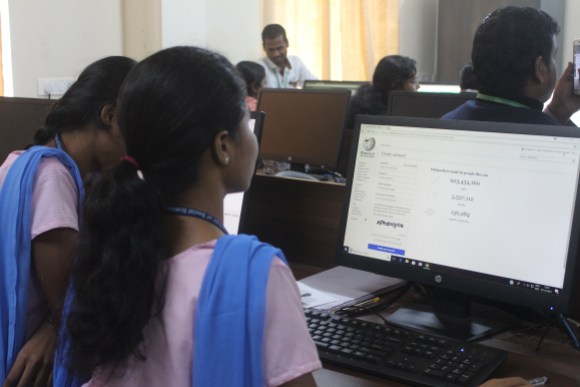
I recently traveled to Nepal, India and Taiwan to meet with local Wikimedians and pilot a new approach to help program leaders in each country establish, improve and grow their educational programs.
In-context help provides program leaders with the opportunity to get support and feedback that is grounded in the needs of the local Wikimedia community, and the local educational landscape. During the site visits, I supported the local Wikimedia community to advocate to institutional partners, listen to the needs of educators, and plan for high quality education programs.
We know that students learn valuable skills when they contribute to Wikimedia projects. On the education team, we want to empower our program leaders to be able to work with educators. But every location around the globe has different challenges and may require slightly different methods of execution.
At Deerwalk Sifal School, a primary school in Kathmandu, Nepali Wikimedians facilitated an elective course that taught students how to edit Wikipedia. The enthusiasm of the students led the teachers to ask to be trained themselves with one teacher noting, “It wasn’t a viable solution to just train the students. So, we asked to be trained so we could continue the class.” Together with local program leader Saroj Dhakal, I visited 5 institutions, all of which expressed great enthusiasm towards the idea of using Wikimedia projects to support student learning.
The time spent with the local Wikimedia community was also incredibly valuable. During a program planning workshop where we looked at local problems and turned them into project objectives, the Nepali Wikimedians discovered that the potential impact of their activities would be greater than words or bytes added on projects. Especially when thinking about gender equality, they expressed that they thought teaching students about anti-harassment and safe space policies would have a ripple effect in the society with students spreading the idea to their friends and families.
From the group discussions in all three site visit locations, we learned that teachers and Wikimedians really understand how using Wikimedia projects in the classroom gives students skills that they need to be successful in the world. Overall, educators saw the value of Wikimedia projects as contributing to a shift in pedagogy from teacher-centred to student-centered learning by getting students to critically engage with the information they consume.
You can learn more about the experience on the online report.
Next steps
This pilot trip is shaping the way in which the education program team is offering support for communities all over the world. We now ask ourselves: How can support for education program leaders all over the world be more equitable and transparent?
We are trying to find ways of giving in-context help on a regular basis. In the coming months, we will be piloting an incubation project, where communities can apply for in-context support. If you are interested in this project and would like to get notifications and news, please sign up on Outreach wiki.
Nichole Saad, Program Manager, Community Programs
Wikimedia Foundation

Can you help us translate this article?
In order for this article to reach as many people as possible we would like your help. Can you translate this article to get the message out?
Start translation